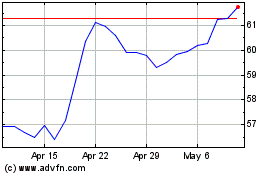By Michael Wursthorn
Morgan Stanley will scale back the recruitment loans it offers
to attract rival brokers to comply with new retirement regulations,
and competitors Merrill Lynch and Wells Fargo & Co. are
weighing similar moves, underscoring the far-reaching impact the
rules are having on the multitrillion-dollar financial-advice
industry.
Morgan Stanley executives, in a conference call with managers
Thursday, said the firm will immediately pull the incentive-laden
back-end portions of recruitment packages it offers brokers to
eliminate potential conflicts that are problematic under the Labor
Department's so-called fiduciary rule, according to a person with
knowledge of the situation.
Bank of America Corp.'s Merrill Lynch wealth-management unit and
the brokerage arm of Wells Fargo are weighing similar moves,
although no decisions have been reached, people familiar with the
matter said.
The Labor Department's fiduciary rule has been roiling the
wealth-management industry since the final draft was unveiled in
April, bringing with it significant changes to how retirement
savers pay for financial advice, how brokers have to put the
interests of those investors first and how they are
compensated.
Already, brokerages such as Merrill Lynch are contemplating a
future without retirement accounts that charge a commission,
putting the industry on a path further away from Wall Street's
traditional pay model in favor of accounts that charge a fee based
on a percentage of assets.
Now brokerages may be seeing the end of the costly but
often-used practice of recruiting experienced brokers from one
another to boost their assets under management. Morgan Stanley's
move and that of other brokerages -- if they follow suit -- would
slash the total value of such deals, which can range up to millions
of dollars for top-producing brokers, and could have broad
implications on how brokerages proceed with hiring practices around
experienced brokers.
It could also push more brokers to consider becoming independent
financial advisers who launch their own registered investment
advisory firms or join an existing one, experts say.
"It's a very difficult dilemma for the firms," said Rogge Dunn,
a labor attorney with Clouse Dunn LLP who works with brokers. "If
the packages are going down, that could mean the talented people at
the top go elsewhere, such as a RIA."
Brokerages frequently hire from one another. The four major U.S.
firms -- Morgan Stanley, Merrill Lynch, UBS Group AG and Wells
Fargo Advisors -- entice brokers to jump from firm to firm by
offering hefty bonuses in the form of loans that are forgivable
over as long as nine years.
Deals typically pay three times the annual revenue a broker
generates off fees and commissions, structuring it so that up to
150% is paid out initially when the broker is hired, while the rest
has to be earned after hitting certain asset and revenue targets
over the life of the deal.
That back-end portion is problematic under the fiduciary rule,
which aims to eliminate incentives that might cause brokers to give
conflicted advice and ensure the interests of retirement savers are
put first.
"Such back-end awards can create acute conflicts of interest
that are inconsistent" with the rule, the Labor Department said in
new guidance to financial firms on Thursday. The guidance further
states firms may not use bonuses or other incentives that are
"intended or would reasonably be expected to cause advisers to make
recommendations that are not in the best interest of the retirement
investor."
That information has prompted brokerages to scramble to decide
how to proceed with those payouts.
The guidance could also have an impact on recruitment loans
handed out before the rule's release, Mr. Dunn said. Brokerages can
renegotiate those earlier deals or continue to honor them, but the
Labor Department wants heightened supervision of those brokers to
ensure conflicts are mitigated.
"The good news is the DOL recognized that many financial
advisers and firms entered into such arrangements before the
issuance of this [guidance]," Mr. Dunn said. "The bad news is that
some firms could take the position that they are required to rework
your contracts."
Industry executives say they expect recruitment deals to be
smaller going forward if the entire industry follows suit. Such a
move would help brokerages contain costs at a time when they are
spending heavily on compliance and supervisory systems to adhere to
the new regulations.
"Recruitment deals are going to change and not for the better"
for brokers, said Louis Diamond, vice president of Diamond
Consultants, a broker recruitment firm. He added firms may consider
alternatives to continue hiring brokers from one another, such as
higher salaries, which wouldn't be an issue under the rule.
Broker defections ramped up after 2004 when firms including
Morgan Stanley, Merrill and others signed the Protocol for Broker
Recruiting, an accord that helped limit the number of lawsuits and
arbitration claims filed over broker moves by outlining an orderly
system for brokers to change jobs. More than 1,200 securities firms
have signed the protocol since then.
Executives have bemoaned the costly practice in recent years,
with some referring to it as a "zero-sum game."
Earlier this year, UBS moved to slash its costs associated with
broker recruiting and said it would reduce by 40% the number of
brokers it poaches annually. It isn't clear if that decision was
based, in part, on the Labor Department's rule; a spokesman didn't
immediately respond to a request for comment.
Write to Michael Wursthorn at Michael.Wursthorn@wsj.com
(END) Dow Jones Newswires
October 28, 2016 16:51 ET (20:51 GMT)
Copyright (c) 2016 Dow Jones & Company, Inc.
Wells Fargo (NYSE:WFC)
Historical Stock Chart
From Mar 2024 to Apr 2024

Wells Fargo (NYSE:WFC)
Historical Stock Chart
From Apr 2023 to Apr 2024
